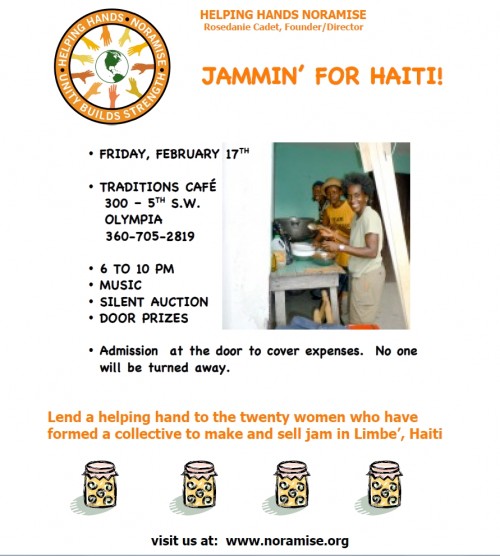Hello,
Previously, I sent out an email discussing how Budd Bay would be working with Helping Hands Noramise to bring about some positive changes in Haiti. Today, I’m pleased to formally announce that Budd Bay Rugby will be working to sponsor a Rugby team in Haiti.
We will be kicking off this effort tomorrow night (Fri, 2/17) at the Jammin’ for Haiti event at Traditions Cafe.
Why are we doing this?
When Budd Bay RFC was founded, one of its principle tenants was to give back – supporting community outreach efforts throughout the Puget Sound. Rugby provides a strong foundation for our players to join a community and grow, both physically and mentally. Encouraging our players to give back helps us ensure that we are giving our players the best possible chance to develop into quality human beings, as well as quality ruggers.
This sense of community, of support, of reliance on one another is an essential principle of rugby, and is an area that Haiti needs to continue to develop.
So bringing Rugby to Haiti seems the only logical next step! In a country where the sport is all but non-existant, we can help grow the game we all love, instill rugby values into the Haitian community, and foster an atmosphere of global awareness and giving within our own organization.
What is Jammin’ For Haiti?
A small group of Haitian women formed a collective to make and sell jars of jam. They were working together – as a team – to succeed. Unfortunately, they were robbed (by their own treasurer no less). This left the women without any income, and further entrenched a belief that teams cannot succeed – that everyone must think about themselves.
This event on Friday is intended to raise money for these women. The money will not be a handout to replace what they’ve lost, but rather, a chance to help them continue to develop a strong business model that will allow themselves to be successful in the long run.
Budd Bay Rugby will be there in force – Traditions Cafe will be closed so we’re providing refreshments (there will be snacks as well), some silent auction items, and some logistical support. There will be other organizations donating items, along with music and fun people.
Come on out, support these women, and help us start our effort to create a global rugby club!
What does it mean to sponsor a rugby team?
Budd Bay will be working on several different approaches. Ultimately the goal is to provide equipment – balls and boots – for youth in Haiti who are interested in participating. Currently, players play barefoot, or share sneakers. Other goals include providing meals for players, and educational materials.
This is intended to be a long term project – we don’t expect to have full teams up and running in Haiti in a few weeks. But the options are endless – who knows – one day we might send a squad of players to Haiti to play against our international partners!
This sounds fun, how can I help?
Join us on Friday! Talk about ideas, meet the people involved, help us plan!
Used cleats are great – have gear that’s a size too small? We’re going to be collecting it over the next few months.
Financial donations are always appreciated, you can do so now at http://noramise.org/donate. We’ll be working on getting our website set up so you can donate through our page too.
And let us know how you’d like to be involved! Got an idea? Want to throw your hand in? There’s so much potential here – it will just take a few interested individuals to turn this into a phenomenal success!
-Kyle
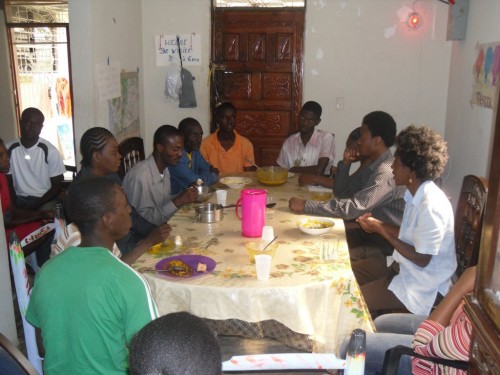
New Year celebration 2011, with soup, at the HHN Center
The year end seems to herald a time for reflection. Two years of engagement in Haiti have been exhilarating, frustrating, rewarding, and filled with opportunities for both personal and organizational growth. We have learned that the pace of change is slow, and our challenge is to keep it steady. We have been richly rewarded in our collaborations with some of our Haitian friends and neighbors and sorely disappointed in others. All part of the process. Some strong connections with other organizations in the area have emerged, and we’ll work to further those in the new year. Most importantly, perhaps, is that our focus on an inter-related set of projects is being validated and reinforced by people and organizations both in and out of the country. Access to clean water, good nutrition and education is the foundation for a healthy future for all Haitians. Our supporters continue to walk hand-in-hand with us on this journey.
In sincere gratitude to: SugarHill Works (www.sugarhillworks.com) for hosting our website and for their endless patience in helping us; Debi Bodett (www.debibodett.com) for sharing her creative skill and energy and remarkable efficiency; Dr. Tiffany Keenan (www.haitivillagehealth.ca) for standing with us at the height of the cholera epidemic and beyond; Patrick Cummings (www.worldwaterpartners.org) for a commitment to clean water for Haiti; Sonje Ayiti (www.sonjeayiti.com) for being a willing resource and sharing valuable information and expertise; Ryan Delaney (www.carbon-roots.org) and his partners for their commitment to restoring the health of Haitian soil and farming through the development and implementation of simple, effective technology. We thank them and you.
Meanwhile, Rosedanie is thinking soup: soup joumou or squash soup. Haitians gained independence from France on January 1, 1804. Prior to that they were not allowed to eat squash soup which was considered a superior dish. It has since been the centerpiece of New Years’ Day Independence celebrations. Cheers!
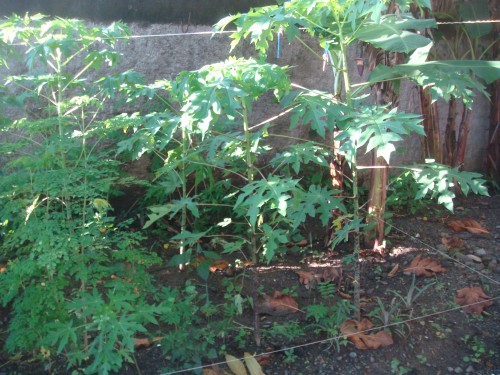
Young papaya trees at HHN center Limbé
In this season of celebration and gratitude, Team Noramise has much to be
thankful for. Two years and countless hours of conversation, work, and
commitment have combined to establish a community center in Limbé where
many positive initiatives have taken root. Clean water, productive gardens,
health and nutrition education, art workshops, collaboration with other
organizations, and neighborhood exchange have all taken place under our roof
and have provided a beacon of light and air in an otherwise mostly downtrodden
community. None of this would be possible were it not for the confidence in us
displayed by contributors in our Orcas Island community and all across the
country. We are extremely grateful for this and send our heartfelt thanks and
warmest holiday wishes to all.
Last month we reported that Ryan Delaney, co-director of Carbon Roots International would be visiting our Limbé Center. Ryan recently received his Master of Science degree from the School of Sustainability at Arizona State University, where he researched technology adoption as a development tool at the community level in Haiti. He and one of his team member stayed at the center for several days, spending time introducing the staff to the process of making bio-char. This rich soil amendment will add to the productivity of our Permaculture garden and will provide a demonstration site for area farmers. Ryan may return to Limbé as early as December bringing with him the bio-char unit developed by him and his team.
We are happy to report that the wonderful jams made by Gwen Stamm on behalf of HHN were all sold online. Sadly, nothing left for our local holiday fairs, but you clearly know a good thing when you read about it. Thanks for your enthusiastic response. Gwen is contributing all proceeds to us. We are filled with gratitude, but unfortunately not with jam, as we did not get our orders in soon enough. If she is kind enough to do this next year we’ll know better!
We are about to begin an incubator preserving project (*see quote below) at the Limbé center. This project is consistent with Rosedanie’s original vision of preserving food and providing employment. The two caretakers at the center will start the business, using abundant fruit available that often rots on the ground while people go hungry. This project meshes with our permaculture garden efforts, our interest in micro-lending to assist start-up businesses, our work to encourage innovation, and our desire to begin making the center self-supporting.
Board news: It was with great pleasure that we welcomed Taylor Diepenbrock to our board at our October 20th meeting. Taylor is an Orcas islander currently studying at William & Mary College in Virginia. Taylor’s interest in Haiti predates the founding of Helping Hands Noramise. As a senior at Orcas Island High School he chose to focus on Haiti for his senior project. He traveled with the first Orcas group to Limbé in February 2010 and returned with a group of Orcas students in July 2010. Please refer to “Notes from volunteers and observers” on our website (www.noramise.org) for a firsthand account of his motivation and travels. We believe that young people like Taylor have so much to contribute, both at home and abroad, and we greatly appreciate his stepping up to further his commitment to service.
*”Haiti has not yet achieved the status of an underdeveloped nation. It is just un-developed. No infrastructure and no structure, either. You see plenty of limes in the market, but couldn’t get enough together to manufacture lime jelly. Can you imagine this country which grows oranges and we import marmalade.” Jean Weiner from “Haiti Best Nightmare on Earth” by Herbert Gold.
This was a month of connections, both new and renewed. With Rosedanie in the U.S., teleconferencing has enabled her to stay current with the activities of the Haiti Committee. There have been some shifting alliances, with Tambour Creole Artist’s Collective moving out from under our umbrella. We wish them the very best as their group grows and changes. We are happy to have had the benefit of their creativity at the HHN Center.
Meanwhile, a connection with one of Bio-char’s (www.carbon-roots.org) founders, Ryan Delaney has been renewed. He will be at the HHN Limbe’ Center next month and will assess the suitability of adding a bio-char system to our growing resource recovery efforts in the garden area.
Dr. Richemond Jean Baptiste has been in touch with us regarding progress on our plan to begin a public health education initiative in the Limbé area. Dr. Tiffany Keenan of Haiti Village Health, headquartered in Bas Limbé will be joining with us on this project.
We mentioned in an earlier post that local supporter Gwen Stamm was making and canning preserves to be sold in support of HHN at an Artisan’s Faire in December. Rosedanie’s original vision for HHN was to build a food processing facility which would employ local people, preserve fruit that often goes to waste, provide nourishment to an under-nourished population, and help sustain programs in health, nutrition, and literacy at the center. We have held onto this vision and continue to move closer to it in a variety of ways including establishing permaculture gardens, exploring various low tech ways of drying fruit, and looking to other organizations in Haiti for successful food processing models. We are learning patience as we take one step at a time.
Board News: It was with great reluctance and regret that on September 11th we accepted the resignation of board member Nathan Yoffa. Nathan brought to us clear thinking, straight forward problem solving, a remarkable level of organization and efficiency, and a very big heart. We thank him for a year of committed, active service and wish him the very best. He is missed.
On August 7th HHN welcomed Haitian Public Health Specialist Dr. Richemond Jean-Baptiste to Orcas. Dr. Richemond and his brother are building a clinic, Hospital Saint Raphael, in Limbé. Their motto is “Serve to heal”, and to this end they will provide full service affordable health care of the people of the region.
We had the opportunity to introduce him to local physicians, Dr. Diane Boteler and Dr. Dale Heisinger, both of whom have experience working in under-served areas of Africa and South America, respectively. The greetings and feelings of camaraderie between these doctors was a pleasure to see. They plan to stay in touch for possible collaboration.
HHN is joining with Dr. Richemond in public health education for the region. Fund-raising continues in an effort to complete the clinic. An interesting and frustrating side note: Dr. Richemond told us that building progress has slowed due to the fact that the price of all materials has sky-rocketed since the 2010 earthquake. Through the kindness of Orcas supporters and a contact at Seattle University, Dr. Richemond returned to Limbé with two badly needed microscopes and other easily transportable supplies.
Michael and Anne Karp joined us for this gathering at the Orcas Library. Michael is the founder and CEO of A W.I.S.H. (www.awish.net) our fiscal sponsor. Both he and Anne are dedicated to positive change in our world and provide for us, and others, a wealth of information and support. They hosted us at a small al fresco dinner following the gathering which gave us a chance to talk further with Dr. Richemond exchanging ideas and possibilities for funding and training.
Through a series of happy coincidences, Rosedanie met Dudney Silla, a young Haitian-born man studying for his master’s degree at the University of Washington who was spending the summer working on the leadership project at YMCA Camp Orkila. Dudney has expressed an interest in joining with us for some leadership training classes in Limbé. We are eager to connect with other young Haitians willing to share their knowledge with their countrymen. You can reach us through the “contact” button on our home page.
By the end of the first week of August, the three hardy troopers ,who had traveled to Limbé in July to teach English, were back on home turf with stories to tell. Please visit the blog and photographs on the home page for some of their impressions. The consensus was the the ESL classes, for both children and adults, were well attended and that progress was made. They noted that our resident Haiti Committee was straining to collaborate and stalled in moving forward on projects. Rosedanie has been focused on helping them gain collaborative skills, but this is difficult to accomplish at a distance and will have to wait until she or another HHN representative is in Limbé. We have learned that, in Haiti, the path to progress begins at the ground level and must be built stone-by-stone and brick-by-brick. We’re doing it.
One of our Orcas supporters, Gwen Stamm, spent hours over a hot stove this month making delicious jams from local fruits and honey which she’ll sell on behalf of HHN at the Orcas Artisan’s Faire the first week of December. This is the second year of her “project preserve”, so we are doubly grateful. Thank you, Gwen.
“Never doubt that a small group of thoughtful, committed citizens can change the world. Indeed, it is the only thing that ever has.” Margaret Mead
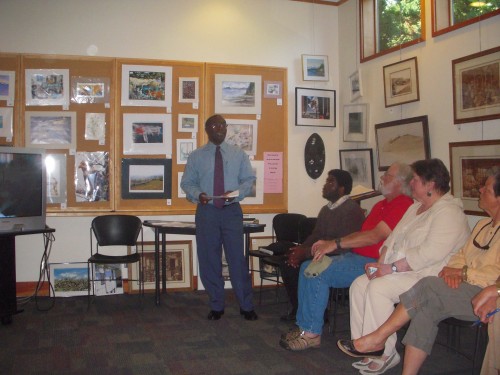
Public health specialist, Dr. Richemond Jean-Baptiste visited Orcas August 7th as a guest of Helping Hands Noramise. Dr. Richemond practices in Limbe’, Haiti and collaborated with HHN on educational outreach at the height of the cholera epidemic in 2010. He was in the U.S. to attend a medical conference in New York and to raise funds for equipment and continued work on the clinic he is building in Limbe’ which will serve all residents regardless of their ability to pay.
Dr. Richemond is shown talking about public health challenges in Limbe’ at a library gathering of Orcas supporters.
I don’t have much time to write today as I’m still in transit. I’ve now left Ayiti and am on my way back home, having left Dave and Jen behind for more days teaching. But these two quotes leapt out at me when I arrived on American soil today:
The guiding of thought and the deft coordination of deed is at once the path of honor and humanity.
-W.E.B. DuBois, ‘The Souls of Black Folk,’ 1903. (Found in the classics section of a Miami airport bookstore)
In this life we cannot always do great things. But we can do small things with great love.
-Mother Teresa (Seen on the back of an aid worker’s shirt in Miami)
So much more to tell later…
Plan, packed, and away. The three volunteer ESL teachers did just that in July when they headed for Limbé where they taught English at the HHN Center to both children and adults. (see blog) This was Nicole’s third trip to Limbé with HHN where she worked on her film making in between times. For Dave and Jen it was a first and an experience they have each said was worthwhile. Our volunteers bring energy, new ideas, and a different perspective to the people of Limbe’, and it is an enriching experience for all.
The demonstration Permaculture garden at the center, tended by Lunise and Merlin, is a source of pride and inspiration for all who see it. Merlin has plans to develop a larger plot to which he has access. Sending the two to the Permaculture course in Cap Haitien was a good investment which is literally bearing fruit.
Orcas Island supporters, and one young man from Olympia, provided us with three laptop computers which the travelers took to Limbé. These will be used at the center for both education and communication. Another step forward.
In August we’ll host Limbé Public Health Doctor Richemond Jean-Baptiste. More about that then.
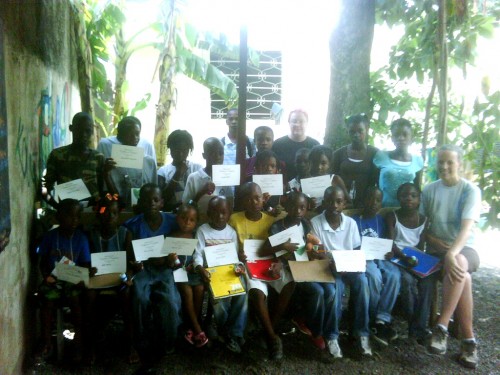
The graduates of the kids class, "Timoun Klas Angle, Kay Noramise", July 2011
Following post is from Dave Parrish:
We’re almost at the end of the first week. I’m getting to know my students whom I like a lot. One thing I’ve noticed is that they aren’t used to group work. Today I was having them write a dialog in pairs where one person would write one line and the next person would write the next. That was a totally foreign concept. Even after my instructions they persisted in writing their own. Finally they relented and tried my way.
I’m guarding in my memory an image of Irose as an image of Haiti. She was sitting at her treadle sewing machine looking at her cell phone.
The heat is unbelievable. I’m thankful for this house and the shade in the back yard.
Two of my favorite parts are the beginnings and endings of class. Singing. They harmonize right away. Full voices.
All for now. Dave
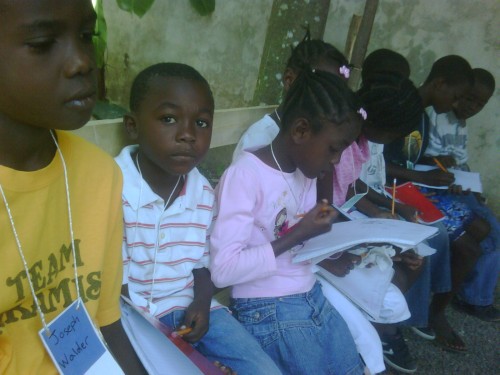
Kids hard at work!
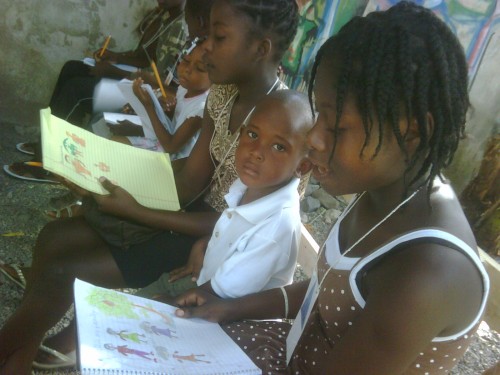
Students tell us about their families with basic drawings
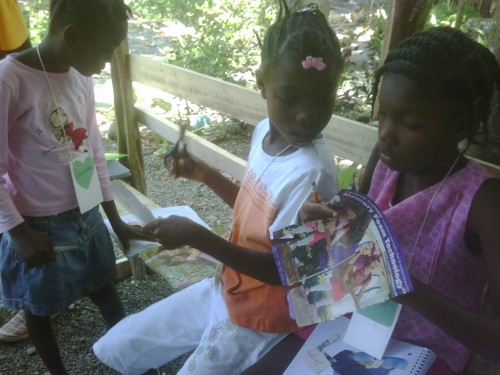
Girls cutting out pictures to describe people’s features
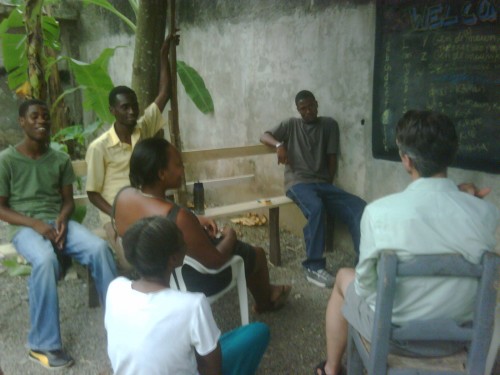
English-Kreyol Hour
Blog post by Nicole Vulcan:
Just finished the second day of teaching English at the Noramise house, and it’s been so much more revealing into the culture than the cordialities can ever be.
Jen and I are teaching the kids class, a sweet group of about 20. In Haiti, 7 year olds are the size of American four year olds, so I look with wonder at the little nymph who is the same age as my own child. With their diminutive frames, ten of them fit on one bench of the Noramise outdoor classroom – which measures about seven feet long. But the differences are more than physical. First off, it’s obvious the kids have very little exposure to visual arts. They can sing in harmony from a very young age, but visually, they know so little.
This morning Jen and I did a unit on families, showing them crude drawings of our own families that we’d colored by candlelight the night before. Then we brought out a box of crayons (lifted from my daughter’s ample art supply shelf) and asked the kids to draw their own families. Never have I seen a group so unwilling or unable to engage with their own creativity. The kids wanted to copy my paper, yellow-colored, blue-eyed figures of my own family; several kids used yellow crayon to draw their figures, wanted to look at my drawing for help knowing how to make a person. Only one boy, the oldest in the class at 14, displayed any sense of creativity on his paper, drawing a Caribbean sunset and palm trees in lieu of the evergreens I’d put on my drawing. The seven year old’s figures were mere blobs of color with no head, arms, legs or other distinguishing features.
It is clear from this group (which I know to be an unrepresentative sample that errs on the more affluent side among denizens of Limbe) that kids here are lacking in creative play. It was also evidenced by the unenthusiastic way they engaged in hopscotch to practice numbers; kids I’ve taught in other countries like this exercise because they get to see their classmates look silly…but in this group half the kids took to sitting down or listlessly looking on. Perhaps the most interesting exercise was watching them play Letter Bingo. Three girls won the first three rounds, making the boys sound off that the “garcons” were losing out in this game of chance. Some of the boys ended up getting the gimmies and expected to be given winner’s prizes, simply because they demanded it be so. When I told them no, they mumbled in Kreyol that they didn’t like the game, though fortunate for me my Kreyol is steadily improving!
I know I should not be upset over the way those boys demanded things… “Nicole give me a chocolate,” since this a symptom of limited English and not necessarily rudeness. Still, I take issue with this child’s sense of entitlement, as if he is somehow exempt from the rules of the game. I naturally extrapolate this into an overall view of the Haitian economy — the majority of its citizens playing by the rules while a few think they deserve more without merit.
Thus the missive of all missives, which comes into play whether it’s in Bingo or world economics: to foster the idea of earning bread through hard work, while all around them men languish with astronomical unemployment, women toil in charcoal-fired kitchens and raise babies, and the country crumbles under officials who seize power and hold on to it absolutely…
I humble myself and admit I don’t know where to begin or even if I’m helping; not the first in a line of blans informing Haitians how to live and be.
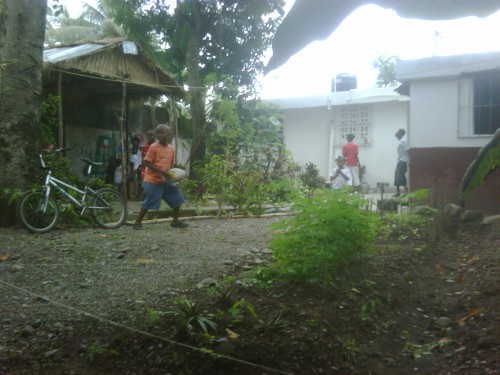
Taking a break for ball during the kids’ English class. See the Team Noramise “jardin” in the foreground, new outdoor classroom to the left!
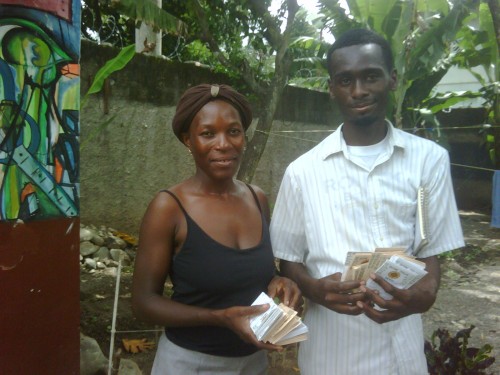
Here are Lunise Joseph and Merlin St. Fleur with the seed packets donated by Sow True Seed of Asheville NC. Lunise and Merlin attended the permaculture design course in PaP in May.
Blog post by Nicole Vulcan…
“I feel like I keep saying O my god,” David says as we round another bend in the Limbe marketplace. True, there is lots to lament upon in this place where soiled discarded shoes mix with old animal horns and a gooey black muck, all very near thin mats where young and old sell beans, rice, used clothing and little bags of Dominican chips.
We’ve been in Limbe now a few days, and have rarely left the Noramise compound. Inside its gates lies a mini Haitian paradise, in the form of clean, dirt free floors (thanks to Rosedanie’s no shoes policy), a tidy yard with fruit trees, shady places for sitting and Lunise’s vegetable beds (one of the caretakers of the house, who recently attended the first-ever Haitian permaculture training in Port-au-Prince), as well as good fresh food and comfortable beds. Yes, showers are by and large taken with a bowl of water flung over the body, and the toilet flushed with buckets, but there ARE toilets and a clean bathroom, which is a far cry from the amenities available in the huts we passed on the road to Limbe.
And, a far cry from the church where we stayed on the team’s first trip, which lacked the basic amenities named above and stood just outside the marketplace. Back then heaps of trash, worse than now, burned in fetid piles. That’s why I had to smile a little when David made his comment, since now, thanks in part to the efforts of Team Noramise, there are no longer piles of burning trash, but instead only smears of trash here and there. Overall, I see improvements in the situation here — in the marketplace, in the accommodations for Noramise volunteers, in the general feeling of hope that pervades the house and the people who are part of the organization. I am heartened by progress as the journey continues, though we all know there is so far to go…
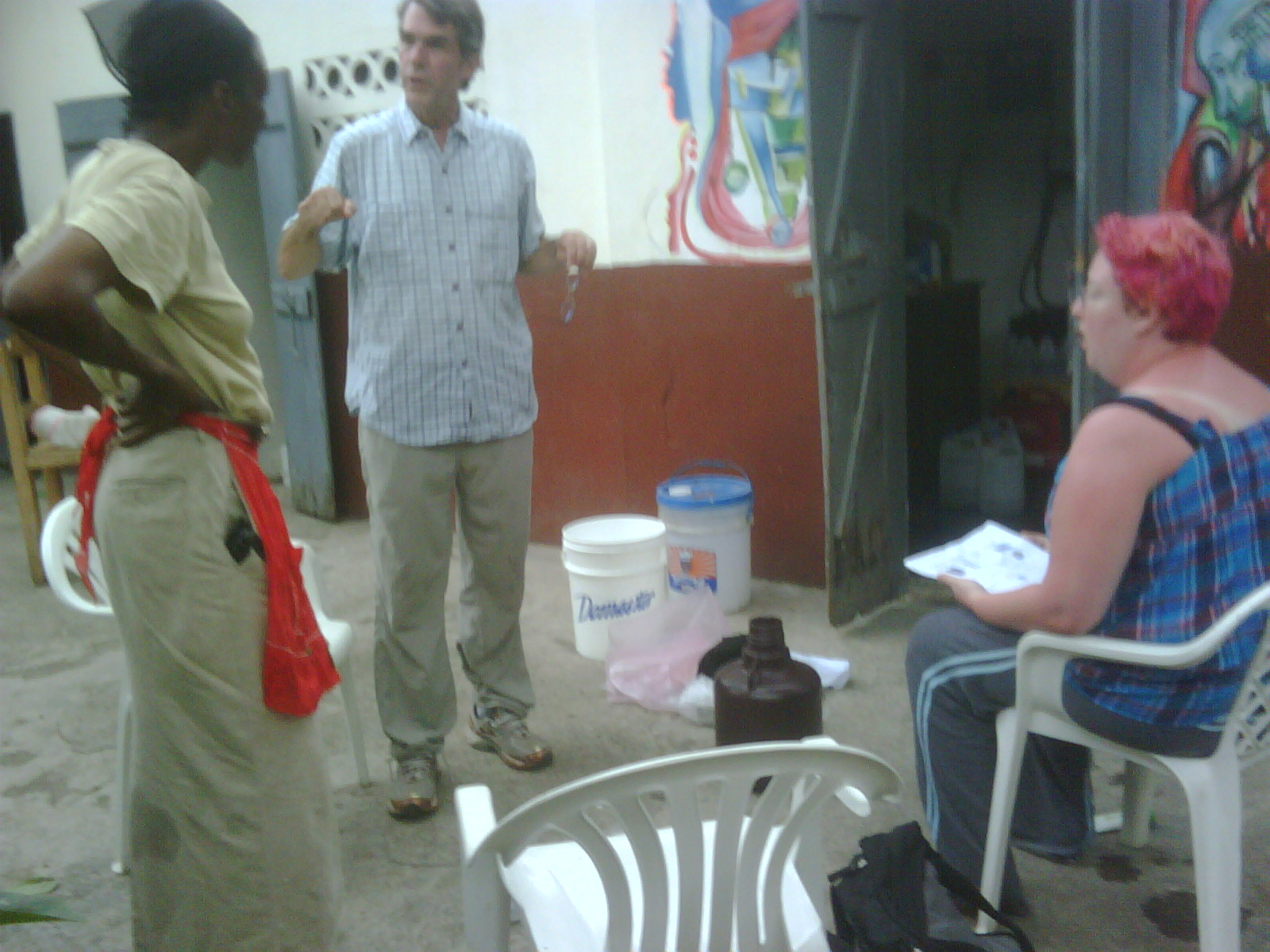
The following post is from Nicole Vulcan, (Vulcan Media Inc.) who is a member of the volunteer team now on the ground in Limbe:
In the film world, one way to move from one distinct scene to another is with a cross dissolve, where one scene slowly blends in to the next. Traveling from the U.S to the Dominican Republic and then on to Haiti is like a cross dissolve. We leave our pretty paved comforts and travel to a place where cracks start to show; things are not as organized or “straight” here, but there is still beauty and order among the raw life of the DR. We stayed in Santo Domingo’s colonial zone, where old meets new, and we were afforded comforts like aircon, cold beer and water flowing freely from the taps.
Then it was on to the other side of the cross dissolve, in the cool cocoon of a Caribe Tours bus, taking us in insulated comfort into Haiti’s northern region. We know this from history books to be the first place colonized in the Americas, once the Pearl of the Caribbean, and upon my third entry into this country I’m still intrigued, shocked and hopeful enough to keep believing the pearl is here…somewhere…
As we pass into Cap Haitien, I see the awe in my companions faces, the same I had, that this city, with its brownblack bay choked with garbage and the carcasses of boats, its streets teeming with sooty burning trashpiles and lotto stands, could possibly ever have been “The Paris of the Antilles.” My own pained awe is lessened somewhat from the last two times, but it’s still there…
As we make our way off the cool bus and into the wash of humid heat, the reality of our arrival hits. This is the part of the film where the dissolve has stopped, and the new scene begins in full; in this case, it begins with the mad thump of four drummers, greeting the arrivals at the bus station.
to be continued….
The team will be working on several projects from July-August, but the principal focus will be ESL training for the Haiti Committee. Visit our website often to see ongoing updates and images posted by the team!


